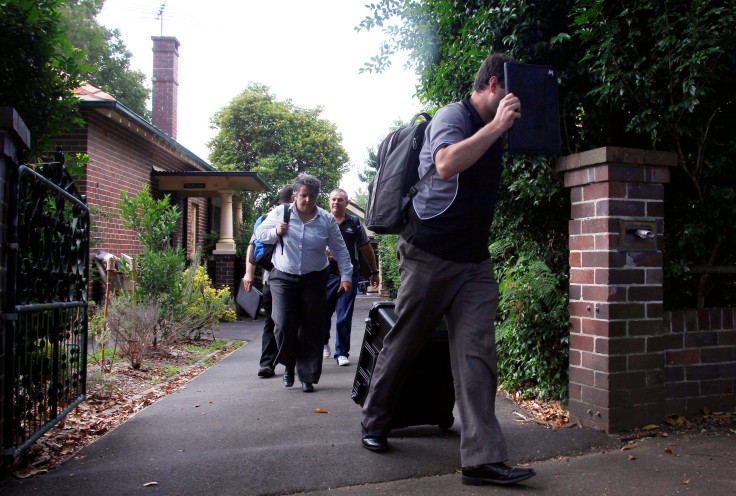Craig Wright Promises ‘Extraordinary Proof’ Of Bitcoin Credentials, But Big Questions Remain

Here we go again.
In December, Wired and Gizmodo told the world that Craig Steven Wright was the founder of bitcoin, thanks to documents and emails leaked to those outlets. Nearly immediately, the claims were widely debunked as a huge hoax. Then on Monday, the burning question of who created bitcoin was supposed to be settled once and for all. Him again.
The same Craig Steven Wright, an Australian businessman and computer scientist, stepped into the limelight with a series of interviews with the Economist, the BBC and GQ, claiming he is the mythic creator of bitcoin, a person who has been known by the pseudonym Satoshi Nakamoto.
Wright also published a blog post backing up his claim and managed to convince two of the most senior figures in the bitcoin community that he's the real thing. But in the space of just minutes, Wright’s claims were being debunked, and over the past 24 hours, major holes have appeared in Wright’s "proof," leading to the conclusion that Wright is, once again, just trying to fool us.
Wright on Tuesday addressed the skeptics, saying that “extraordinary claims require extraordinary proof." He promised that in the next few days he “will present what I believe to be 'extraordinary proof' and ask only that it be independently validated.” For one piece of proof, he says, he'll move bitcoin from a location believed to be controlled by Satohsi Nakamoto. But he's aware that still might not be enough to convince some people.
“For some, there is no burden of proof high enough, no evidence that cannot be dismissed as fabrication or manipulation,” Wright said. “This is the nature of belief, and swimming against this current would be futile.”
The search for Satoshi has been an intriguing mystery for awhile now, perhaps more interesting than the highly technical and complex developments of the cryptocurrency itself. It matters because whoever created the cryptocurrency is the person who controls the very first bitcoin block — the so-called Genesis Block — which could be used to conclusively prove the identity of Satoshi Nakamoto as well as controlling a vast fortune estimated at some 500,000 to 3 million coins, worth somewhere between $2.2 million and $1 billion-plus, at today's exchange rate.
While the identity of Satoshi Nakamoto isn't crucial to the future of the cryptocurrency — many, frankly, see it as a distraction — it may be crucial to the scale of its growth. A split within the bitcoin community over how the digital currency should be progressed is threatening to cripple its development, but a signal from the creator of bitcoin in either direction could sway the argument.
Aware that he's failed to conclusively convince the world he is Satoshi Nakamoto, Wright now plans to offer even more proof. Until then, there are holes big enough in his story to keep the doubters busy:
Here's 'Proof'
The first indication that Wright’s claims were not going to hold water came within 90 minutes of his blog post proclaiming “Satoshi is dead” and carrying a message signed with a cryptographic key long believed to belong to the creator of bitcoin, coming from the ninth bitcoin block ever mined, back in 2009.
In the blog, Wright claims to have used the key to sign a message containing text about French philosopher Jean-Paul Sartre. However, as Reddit user JoukeH points out, the key was in fact from the first ever bitcoin transaction, between Satoshi and Hal Finney, an American cryptographic pioneer, carried out in 2009 and publicly available for anyone knowing where to look.
I understand that Satoshi is basically Moby Dick for Tech Reporters, but the identity of Bitcoin's absentee creator is not relevant.
— Dan Kaminsky (@dakami) May 2, 2016
Not only was the “proof” shown to be inconclusive, but there were several other technical problems with Wright’s blog post, which Adam Goucher, a mathematics student at Trinity College, Cambridge, calls “suspicious.” The post “contains various misconceptions that one would not expect from an expert in the field, let alone the originator of bitcoin,” Goucher said, concluding “As the evidence stands, I would not like to bet any money, cryptographic or otherwise, on the validity of Wright’s claim.”
Dan Kaminsky, a cybersecurity expert, claims this is absolutely a scam by Wright, while fellow security expert Robert Graham has published a step-by-step guide to debunking Wright’s claim.
Wright is now prepared to provide more evidence by moving a coin from an early bitcoin block, but if it's not from the first bitcoin block ever mined — the so-called Genesis Block — then the skeptics are likely to remain skeptical.
The Power of Endorsements
To further support his claims, Wright secured the endorsement of two major figures within the bitcoin community. Gavin Andresen, who has been a vocal skeptic of all previous claims to the Satoshi name, is the most compelling. After being flown to London and spending time with Wright, during which he witnessed a separate demonstration of Wright signing a message with a key believed to be controlled by Satoshi — Andresen was convinced.

“After spending time with him, I am convinced beyond a reasonable doubt: Craig Wright is Satoshi,” Andresen wrote on Monday. Andresen took control of the development of bitcoin from Satoshi when the creator of the cryptocurrency stepped aside to work on other things. While he has since passed the baton, he remains a key figure in the community and continues to contribute code to the project.
Wright has also convinced Jon Matonis, an economist and a founding director of the Bitcoin Foundation, who was also flown to London last month. “I had the opportunity to review the relevant data along three distinct lines: cryptographic, social and technical. Based on what I witnessed, it is my firm belief that Craig Steven Wright satisfies all three categories.”
The problem for the rest of the world: The proof provided to Matonis and Andresen (as well as journalists from the Economist, the BBC and GQ) is that it has not been made public. Andresen has said he was not allowed to take the key with him as it could have leaked and broken the news earlier than Wright wanted.
There are also questions about the validity of the test carried out by Andresen and Matonis. Describing the procedure to Wired, Andresen said he was provided with “a factory-sealed” laptop onto which he downloaded a fresh install of a program called Electrum, software that can be used to validate bitcoin transactions.
However, Electrum has revealed that no download of its software took place on April 7, the day of the test, from a computer based in the UK. While this is certainly not conclusive proof it does call into question the method used, and raises the question of why Andresen could not use his own laptop or why Wright could not have downloaded a copy of the bitcoin blockchain (which is now approaching 70GB in size) in order to validate his signature.
Both Andresen and Matonis say they reached their decision based not only on the technical proof provided but also on the basis of conversations they had with Satoshi over email when bitcoin was just starting out, which matched the way Wright conversed with them in person. But for the rest of the bitcoin community, this is simply not enough.
Bitcoin Community Speaks
Despite Andresen and Matonis coming out in support of Wright’s claims, the overwhelming majority of opinions expressed since the revelation on Monday have been questioning the validity of the claim.
“It would be like if I was trying to prove that I was George Washington and to do that provided a photocopy of the Constitution and said, 'Look, I have George Washington’s signature,” bitcoin developer Peter Todd told Motherboard two weeks after he'd been contacted by someone using the same signature as proof. Todd ignored the email.
Oleg Andreev, a bitcoin blogger and architect at blockchain startup Chain, has called Wright “a brilliant troll” while saying that so far no one has provided real proof that he or she is Satoshi Nakamoto. “It’s quite easy to prove that all claims by Mr. Wright regarding his link to Satoshi are either irrelevant (such as general knowledge of how bitcoin works) or outright fabricated,” Andreev said in a blog post.
The news about Wright’s claim broke during Consensus 2016, a major conference about the blockchain technology that underpins bitcoin. At one of the high-profile panels there on Monday, a vote was taken to see who believed Wright was Satoshi. Of the four people on the panel, just one (Brian Hoffman, who operates the decentralized eBay OpenBazaar) said Wright was the creator of bitcoin, with the other three (ShapeShift CEO Erik Vorhees, Blockstak Labs co-founder Ryan Shea and Lightning CEO Elizabeth Stark) all indicating they didn’t believe Wright’s claims.
Also speaking at Consensus 2016 was Vitalik Buterin, the co-founder of public blockchain platform Ethereum, who questioned Wright’s choice of proof.
“He had the opportunity to take two different paths of proof,” Buterin said, according to CoinDesk. “One would have been that exact same proof [that he showed Gavin], make the signature and then put it into the blog post. And then let the cryptographic community analyze it. The other path is to try to show that signature to only a few people. Signaling theory says if you have a good way or a noisy way to prove something and you choose noisy, it could mean that you can’t do the good way."
Gone Again
Having published his claim, Wright has made it very clear he's not willing to do any more interviews or provide any more proof.
“Look, I’m doing this, then I’m disappearing,” Wright told GQ in what the magazine describes as a fractious and incredibly heated interview. “I’m not doing this to try and get in the media. This will never happen again. You’ve got this one thing. If you don’t like it, f--- off.”
He told the Economist he was “not going to keep jumping through hoops,” while he told the BBC: “I would rather not do it. I want to work, I want to keep doing what I want to do. I don’t want money. I don’t want fame. I don’t want adoration. I just want to be left alone.”
Wright claims he came forward now to set the record straight and correct misinformation (his word) in the media that's impacting not only him but his family, friends and colleagues.
It remains to be seen whether his latest moves will help: He has orchestrated a huge media circus by providing three outlets with access to him, while he has also failed to set the record straight by providing enough proof to his claims.
The situation is further clouded by the fact he approached writer Andrew O’Hagan, who previously wrote an unofficial biography of Julian Assange, about writing a long-form account of Wright’s journey to become Satoshi Nakamoto back in December. O’Hagan has spent the last six months with access to Wright as he traveled from Australia to the U.S. and U.K., suggesting that the businessman was seeking to out himself as the creator of bitcoin before he was forced to do so by media reports. The account will be published by the London Review of Books later this month.
Tax Evasion
The day Wired and Gizmodo published their investigations into Wright last December, his home in Sydney was raided by the Australian Taxation Office. The officials claimed it was in relation to a long-running tax payment issue, not to Wright’s bitcoin connection. Local reports suggest the ATO investigation could be looking into allegations of fraud while Wright himself claims it concerns how bitcoin should be taxed, something the Australian authorities are unable to figure out.

Wright left Australia for London in December and has not returned, prompting some to suggest he is avoiding the investigation, and using the claim to be Satoshi Nakamoto as a smoke screen to deflect attention.
Well-known internet security blogger Nik Cubrilovic has looked into Wright’s various companies in Australia (including Hotwire, DeMorgan, CloudCroft, Panopticrypt, Coin-Ex and Denariuz) and found a strange web of connections where one company paid $29 million for software belonging to the Wright Family Trust — effectively Wright paid himself for software he already owned. The companies also sought to take advantage of an Australian tax break which Cubrilovic suggests was not entirely on the level.
“One can come away from reading about his firms with the conclusion that their primary business was to seek tax refunds from the government, and that most of the businesses were set up precisely for this.”
© Copyright IBTimes 2024. All rights reserved.






















